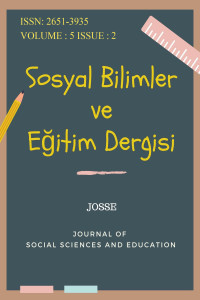Öz
Sömürgecilik sonrası çalışmalarda kültür ve kimlik konuları büyük bir yer tutmaktadır. Çağdaş bilim insanları, farklı gruplara ait kültürlerin kesişimini ve bu gruplar içindeki bireylerin kimlik krizlerini yoğun olarak tartışmaktadırlar. Buna bağlı olarak, bu ilişkilerin görünmeyen yönlerini anlamaya dayalı yeni anlayışlar edebiyata kazandırılmaktadır. Bu çalışmada, baş kadın kahraman Kehinde’nin Igbo olarak adlandırılan ya kendi Afrika kültürünü ya da sonradan edindiği Avrupa kültürünü tercih etmek zorunda kalması nedeniyle Nijeryalı feminist yazar Buchi Emecheta’nın Kehinde romanı (1994) kültür ve kimlik mercekleri üzerinden analiz edilmektedir. Bu baskı Kehinde’nin iki farklı kimlik arasında çabalamasına neden olur: bir tarafta yerel geleneklerine bağlı Nijeryalı bir kadın, diğer tarafta özgürlüğü savunan Avrupalı bir kadın, ki Kehinde daha çok ikincisine meyillidir. Çalışma, kuramcı Homi K. Bhabha’nın, kültür ve kimlik konularını, melezlik ve üçüncü alan gibi belirli terimlerle tamamlayıcı olarak ele aldığından dolayı sömürgecilik sonrası kavramları ile ele alınmıştır.
Anahtar Kelimeler
Kaynakça
- Akçeşme, B. (2021). Exploring un/homely lives in Mohsin Hamid’s novel the reluctant fundamentalist. KARE- International Comparative Journal of Literature, History and Philosophy, 12, 16–44.
- Baloyi, E. M. (2013). Critical reflections on polygamy in the African Christian context. Missionalia, 41(2), 164–181. https://doi.org/10.7832/41-2-12
- Bhabha, H. K. (2004). The location of culture (Routledge Classics) (2nd ed.). London: Routledge.
- Bhabha, H. K. (2017, December 7). Diaspora and Home: An Interview with Homi K. Bhabha. De Gruyter Conversations. Retrieved June 23, 2022, from https://blog.degruyter.com/diaspora-and-home-interview-homi-k-bhabha/
- Bhandari, N. B. (2022). Homi K. Bhabha’s Third Space Theory and Cultural Identity Today: A Critical Review. Prithvi Academic Journal, 171–181. https://doi.org/10.3126/paj.v5i1.45049
- Byrne, E. (2009). Homi K. Bhabha. New York: Palgrave Macmillan.
- Emecheta, F. O. (1994). Kehinde. Portsmouth: Pearson Education.
- Gündüz, E. İ. (2014). Kehinde: Floundering between two opposite worlds. Cankaya University Journal of Humanities and Social Sciences, 11 (1), 65-74.
- Rutherford, J. (1990). The Third Space. Interview with Homi Bhabha. In: Ders. (Hg): Identity: Community, Culture, Difference. London: Lawrence and Wishart, 207-221
- Singh, A. (2018). Home and belonging in Buchi Emecheta’s Kehinde. RESEARCH REVIEW International Journal of Multidisciplinary, 3(1), 382–384.
- Umeh, M. (1996). Emerging perspectives on Buchi Emecheta. Amsterdam: Amsterdam University Press.
- UNESCO. (1997, January). A cultural approach to development (CLT.97/WS/1). Paris.
- Yousfi, H. (2013). Rethinking hybridity in postcolonial contexts: What changes and what persists? The tunisian case of Poulina’s managers. Organisation Studies, 35(3), 393–421. https://doi.org/10.1177/0170840613499751
Öz
Culture and identity issues occupy a great deal of place in postcolonial studies. Contemporary scholars have been highly debating the intersection of cultures belonging to divergent groups and the identity crises of individuals within those groups. Accordingly, new insights based on understanding the invisible aspects of these relations are gained to literature. In this study, Nigerian feminist writer Buchi Emecheta’s Kehinde (1994) is analysed through the lenses of culture and identity since the protagonist Kehinde is forced to prefer either her native African culture, called Igbo or her acquired European culture. Such pressure causes Kehinde to strive for two different identities: a Nigerian woman adhering to local traditions and a European woman favouring freedom, though she is inclined to the latter. The paper has been approached by theorist Homi K. Bhabha’s postcolonial notions since he holds culture and identity issues complementarily with particular terms which are hybridity and third space.
Anahtar Kelimeler
Kaynakça
- Akçeşme, B. (2021). Exploring un/homely lives in Mohsin Hamid’s novel the reluctant fundamentalist. KARE- International Comparative Journal of Literature, History and Philosophy, 12, 16–44.
- Baloyi, E. M. (2013). Critical reflections on polygamy in the African Christian context. Missionalia, 41(2), 164–181. https://doi.org/10.7832/41-2-12
- Bhabha, H. K. (2004). The location of culture (Routledge Classics) (2nd ed.). London: Routledge.
- Bhabha, H. K. (2017, December 7). Diaspora and Home: An Interview with Homi K. Bhabha. De Gruyter Conversations. Retrieved June 23, 2022, from https://blog.degruyter.com/diaspora-and-home-interview-homi-k-bhabha/
- Bhandari, N. B. (2022). Homi K. Bhabha’s Third Space Theory and Cultural Identity Today: A Critical Review. Prithvi Academic Journal, 171–181. https://doi.org/10.3126/paj.v5i1.45049
- Byrne, E. (2009). Homi K. Bhabha. New York: Palgrave Macmillan.
- Emecheta, F. O. (1994). Kehinde. Portsmouth: Pearson Education.
- Gündüz, E. İ. (2014). Kehinde: Floundering between two opposite worlds. Cankaya University Journal of Humanities and Social Sciences, 11 (1), 65-74.
- Rutherford, J. (1990). The Third Space. Interview with Homi Bhabha. In: Ders. (Hg): Identity: Community, Culture, Difference. London: Lawrence and Wishart, 207-221
- Singh, A. (2018). Home and belonging in Buchi Emecheta’s Kehinde. RESEARCH REVIEW International Journal of Multidisciplinary, 3(1), 382–384.
- Umeh, M. (1996). Emerging perspectives on Buchi Emecheta. Amsterdam: Amsterdam University Press.
- UNESCO. (1997, January). A cultural approach to development (CLT.97/WS/1). Paris.
- Yousfi, H. (2013). Rethinking hybridity in postcolonial contexts: What changes and what persists? The tunisian case of Poulina’s managers. Organisation Studies, 35(3), 393–421. https://doi.org/10.1177/0170840613499751
Ayrıntılar
| Birincil Dil | İngilizce |
|---|---|
| Konular | Eğitim Üzerine Çalışmalar |
| Bölüm | Research Article |
| Yazarlar | |
| Yayımlanma Tarihi | 30 Ekim 2022 |
| Kabul Tarihi | 29 Ekim 2022 |
| Yayımlandığı Sayı | Yıl 2022 Cilt: 5 Sayı: 2 |


